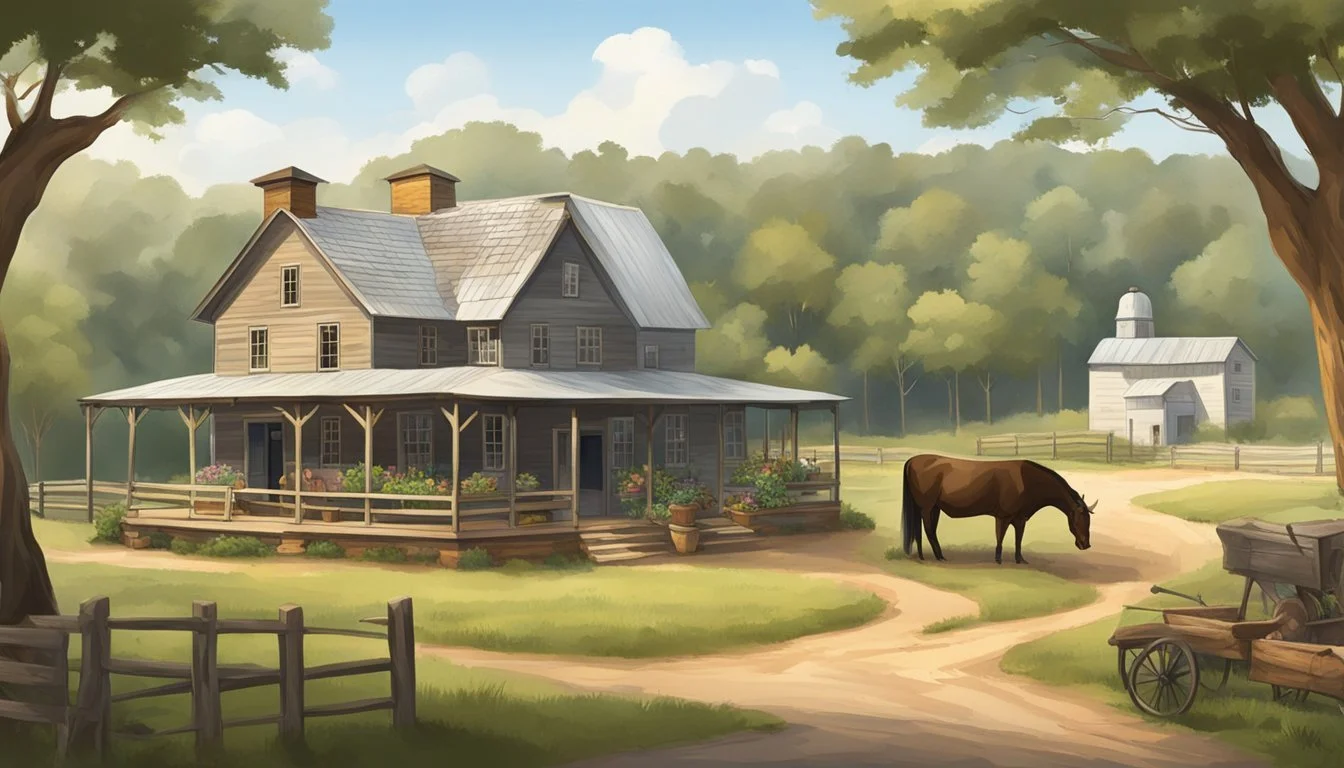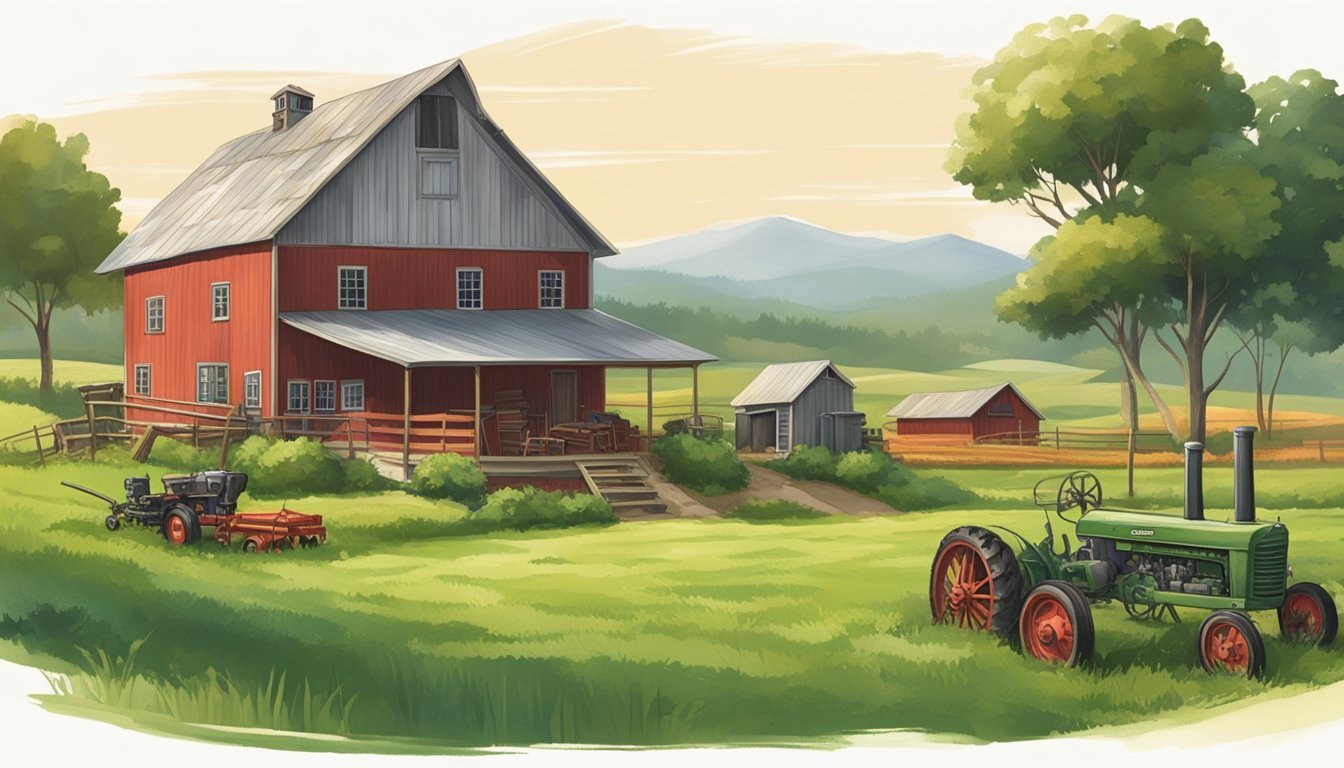Historical Farms and Agricultural Museums in South Carolina
A Tour of Heritage and Culture
South Carolina's rich soil and temperate climate have long provided the ideal conditions for agriculture to thrive. Farms rooted in history tell a tale not just of the land but also of the people who worked it, from Native Americans to contemporary farmers. These historical sites and the agricultural museums scattered throughout the state serve as important custodians of this deep-rooted heritage. They offer insights into the evolution of farming practices, the historical significance of agriculture in the region, and its profound impact on South Carolina’s culture and economy.
The Bart Garrison Agricultural Museum of South Carolina stands as a proud testament to this legacy. It focuses on both preserving the past and looking toward the future of agricultural practices. Visitors are encouraged to engage with the exhibit's interactive elements that bring the agrarian lifestyle closer to modern understanding. In much the same way, historical farms provide a tangible link to the past, allowing people to step back in time and experience the rural life of the early settlers and indigenous communities.
As the state moves forward, the relationship between its residents and the land remains constant and is celebrated through these living museums. They not only commemorate South Carolina’s agricultural past but also educate and inform current and future generations on sustainable practices. This balance of honoring tradition while embracing advancement cultivates a unique educational experience that underscores the importance of agriculture in South Carolina’s continuous growth.
Historical Context of South Carolina Agriculture
South Carolina's rich soil and temperate climate have played a central role in its agricultural history, with farming practices evolving over time and influencing American history significantly.
Evolution of Farming Practices
In the early days, South Carolina agriculture was dominated by the cultivation of indigo and rice, but the discovery of the profitability of cotton in the 19th century led to its predominance. Techniques varied from the manual labor-intensive methods of the past to the more mechanized approaches of the 20th century. The Bart Garrison Agricultural Museum of South Carolina provides insights into how these practices have shaped the region's farming heritage.
The 20th century introduced pest management and crop rotation, significantly altering the farming landscape. Technological advancements such as the tractor and the cotton gin transformed agriculture into a more efficient industry. These innovations are detailed in historical records and demonstrate South Carolina’s adaptation to modern agricultural methods.
Influence on American History
The agriculture of South Carolina has exerted a profound influence on the broader history of the United States. Cotton, once known as "King Cotton," became a staple that fueled the American economy and catalyzed the growth of other sectors. This crop's impact is evident in local museums, like the Agricultural Heritage Museum, which narrates this saga.
Moreover, the labor and lives of people who worked the land—both free and enslaved—have significantly marked American history. The state's agricultural narrative intertwines with the struggle for civil rights and the transformation of societal structures. South Carolina's experience offers a microcosm of the agricultural evolutions that have shaped the nation itself.
Key Historical Farms and Museums
South Carolina's rich agricultural history is showcased through various historical farms and museums spread across the state. These institutions serve as guardians of the past, providing insights into early farming techniques, the lives of plantation workers, and the evolution of agriculture.
Bart Garrison Agricultural Museum of South Carolina
The Bart Garrison Agricultural Museum of South Carolina offers a comprehensive view of the state's farming history with interactive exhibits. Items on display range from historic farm equipment to exhibits on modern agricultural practices, emphasizing the ongoing relevance of farming to the state's economy.
Redcliffe Plantation State Historic Site
Redcliffe Plantation State Historic Site stands as a testament to antebellum life, with the main house, slave quarters, and outbuildings meticulously preserved. Visitors can explore the site to understand the complex history of the plantation system and the lives of the people who lived and worked there.
Historic Houses and Plantations
Charleston, Columbia, and Myrtle Beach serve as gateways to numerous historic houses and plantations that were once the backbone of South Carolina's economy. These sites often include original structures like manor homes, slave quarters, and various outbuildings, allowing for a more encompassing understanding of South Carolina's agricultural and social history.
Cultural Significance and Educational Programs
Historical farms and agricultural museums in South Carolina play a pivotal role in preserving the region's rich cultural heritage and providing dynamic, hands-on educational programs. Through living history demonstrations and school activities, these institutions foster a connection to the land and its history, enlightening individuals of all ages.
Living History and Demonstrations
The Bart Garrison Agricultural Museum of South Carolina provides an immersive experience where visitors can engage with the state's agricultural past. Their approach encourages guests to 'get their hands in the dirt,' which signifies a commitment to living history and active participation. This method allows visitors to observe and take part in traditional farming techniques and crafts, underscoring the practical aspects of historical agriculture.
Curriculum-Based School Activities
Agricultural museums often offer customized learning experiences aligned with educational standards. For instance, the Agricultural Heritage Museum in Blackville orchestrates curriculum-based activities that cater to school groups. These programs are designed to enhance students' comprehension of historical and modern farming practices while incorporating STEM elements to elucidate the science behind agriculture.
Community Outreach and Events
Historical farms such as Historic Brattonsville and the L. W. Paul Living History Farm at the Horry County Museum extend their educational reach through community events. They host special events for a broad audience, including youth and church groups, to share the heritage and ongoing influence of agriculture in South Carolina. These events often celebrate traditional practices and invite community interaction, ensuring that the cultural and historical significance of farming remains relevant to contemporary society.
Visitor Experience
The visitor experience at historical farms and agricultural museums in South Carolina offers a rich tapestry of educational guided tours, family-friendly attractions, and versatile special event spaces.
Guided Tours and Exhibits
Visitors to the Bart Garrison Agricultural Museum of South Carolina can immerse themselves in guided tours that educate on local agricultural practices. The museum boasts interactive exhibits where attendees can learn about the region’s farming history and browse through an array of educational seminars designed to enrich the experience.
Family Friendly Attractions and Amenities
These destinations cater to families, offering a variety of attractions that allow for a hands-on approach to learning. For example, the Bart Garrison Agricultural Museum hosts summer camps and gardening experiences that are perfect for families. Amenities such as picnic areas provide space for relaxation and family time. Additionally, there are animal displays and interactive demonstrations to engage visitors of all ages.
Special Event Spaces
Historical farms and museums frequently feature special event spaces that can be rented for private functions such as weddings or corporate events. The Horry County Museum, with its educational programs and living history farm settings, offers an attractive backdrop for any event. A museum may also include a gift shop, where visitors can purchase souvenirs that reflect the heritage and culture of South Carolina's agricultural past.
Conservation and Preservation Efforts
In South Carolina, dedicated efforts are underway to safeguard the state's rich agricultural history. Through the meticulous conservation of buildings and artifacts, and the roles of various organizations and museums, the preservation of this heritage ensures that vital aspects of the past remain a touchstone for future generations.
Role of Museums and Organizations
A range of museums and organizations have taken up the mantle of protector and educator of South Carolina’s agricultural past. The Bart Garrison Agricultural Museum of South Carolina stands out as a beacon in these efforts, interpreting and preserving the state's agricultural heritage. They collect and exhibit artifacts and information, displaying the significant impact of agriculture on the state's culture and economy. Furthermore, the South Carolina Department of Archives and History implements programs through the State Historic Preservation Office (SHPO), funded by the National Park Service, which are instrumental in to preservation through local and state efforts across South Carolina.
Preservation of Buildings and Artifacts
Preservation of architecture and artifacts is critical in conveying the tangible history of agriculture in South Carolina. This includes the use of legal tools such as the Conservation Easement Act, which helps in preserving historic properties. Moreover, entities like the Agricultural Heritage Museum play a pivotal role in maintaining historical agricultural structures and providing hands-on learning experiences that connect visitors intimately with the agricultural endeavors that have shaped the state over the centuries.
Supporting Resources
Supporting the preservation and education of South Carolina’s agricultural history can be achieved through various channels such as becoming a member or volunteer at local agricultural museums, and engaging in educational and research opportunities. The Bart Garrison Agricultural Museum of South Carolina and the Agricultural Heritage Museum provide avenues for such involvement.
Membership and Volunteer Information
Bart Garrison Agricultural Museum of South Carolina offers opportunities for individuals to join as members, fostering a closer connection to the museum’s mission. Members receive exclusive updates and are often invited to special events. For those looking to be more hands-on, volunteering is a rewarding option. Volunteers can check the museum’s website for application details.
Membership Benefits:
Newsletter subscriptions
Invitations to special events
Volunteer Opportunities:
Guided tour facilitation
Special event assistance
Educational and Research Opportunities
The University of South Carolina plays a significant role in supporting agricultural education and research. Students and researchers can explore a variety of topics related to the state's agricultural legacy. They are encouraged to visit the Agricultural Heritage Museum to further their studies.
Educational Programs:
Curriculum-based school activities
Guided tours for educational insight
Research Facilities:
Access to historical farm data
Resources for agricultural studies
Planning Your Visit
When organizing a trip to South Carolina's historical farms and agricultural museums, visitors should be well-informed about operation schedules, ticket purchases, site accessibility, and how to make contact with each destination for a smooth experience.
Operating Hours and Ticketing
Bart Garrison Agricultural Museum of South Carolina is open to the public with specific hours of operation. Visitors are encouraged to check the museum's website for the most up-to-date schedule. While walk-ins are welcome, the museum may offer guided tours that could require advanced booking.
Operating Hours:
Tuesday - Friday: 12 PM - 5 PM
Saturday: 10 AM - 4 PM
Ticketing:
Adults: $5
Children (5-12): $3
Under 5: Free
Guided Tours: Contact for pricing
Accessibility and Directions
The facilities prioritize accessibility, ensuring that guests with disabilities can navigate the sites effectively. Each museum provides parking and is reachable via main roads. For precise directions, it's recommended to review the location's address on their official website or use a GPS navigation system with the provided address.
Bart Garrison Agricultural Museum of South Carolina:
Address: 120 History Ln, Pendleton, SC 29670
Contact Information
For further inquiries, such as group visits or event planning, visitors should utilize the contact information available on the museum's sites. A phone call or email can clarify any specifics not detailed online and assist with special accommodations.
Bart Garrison Agricultural Museum:
Phone Number: (864) 646-7271
Email: info@bgamsc.org
Full contact list on the website for different departments.







